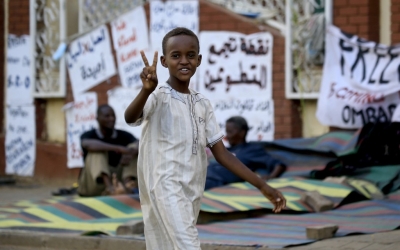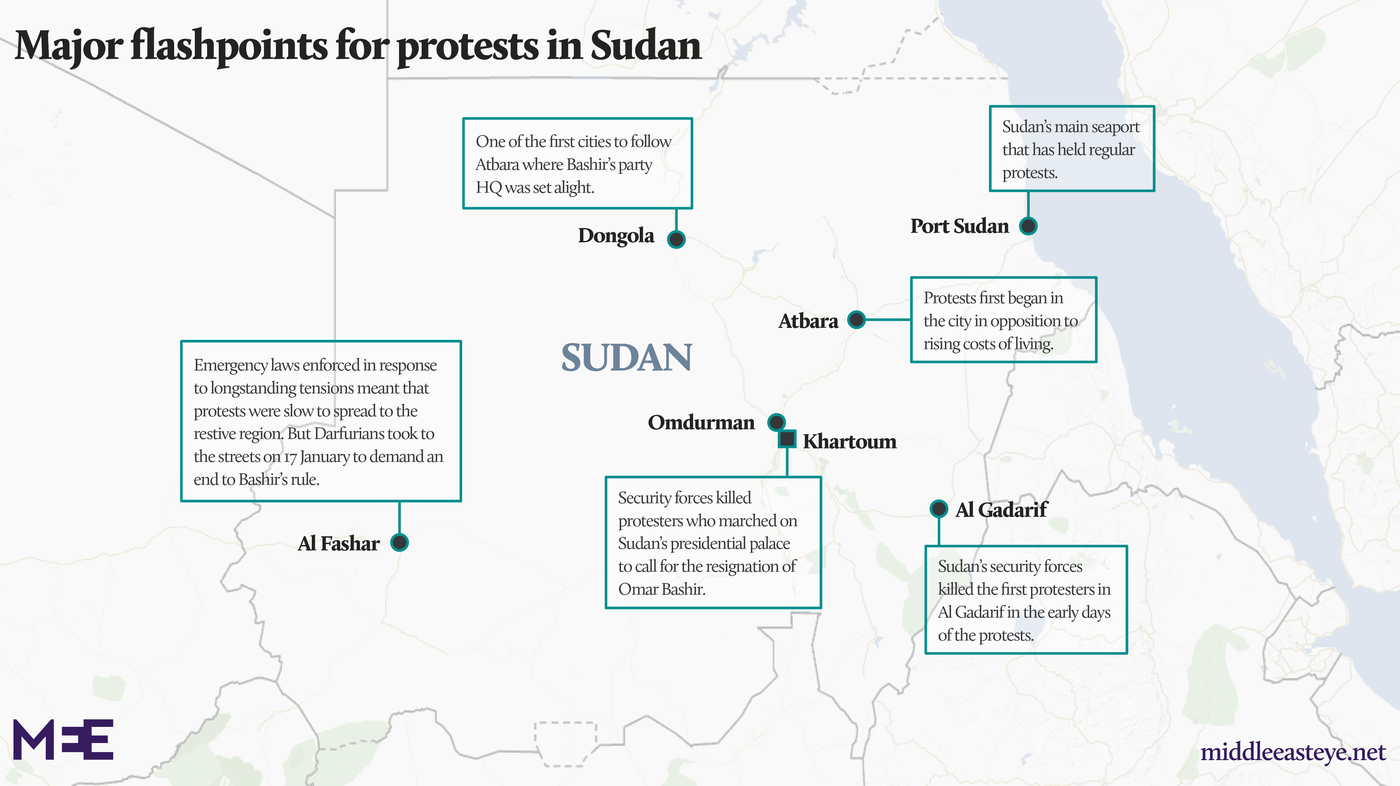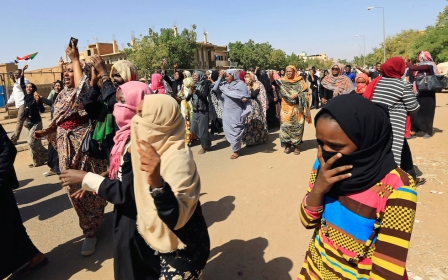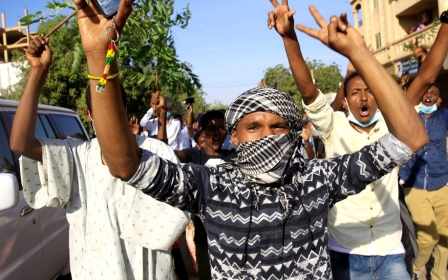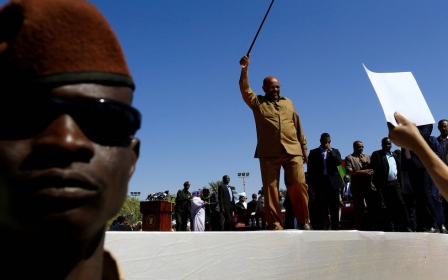Strikes, protests and a massacre: The port in the Sudanese storm
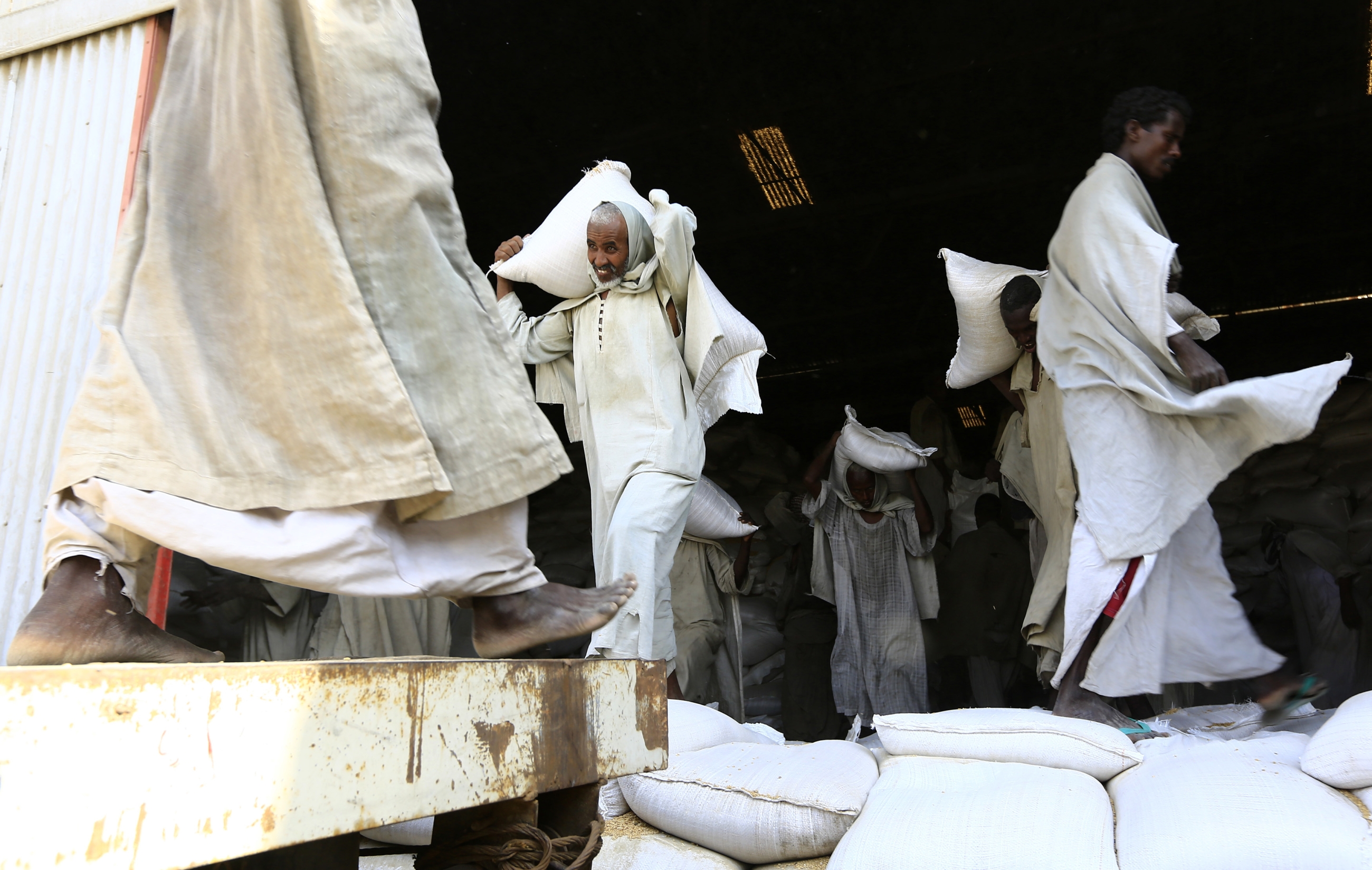
Naturally, as crowds swell daily in the Sudanese capital, protests in Khartoum calling for “freedom, peace and justice” have caught the world’s attention.
But to the city’s northeast, on the Red Sea coast, a combination of historic resentment, poverty and mistrust of the government is providing a microcosm of the many challenges that President Omar al-Bashir faces.
Port Sudan is a vital economic artery in a country struggling to pull itself out of a financial mire.
The main gateway for Sudan’s imports and exports, disruption at its port could have dramatic knock-on effects for the rest of the country.
Yet an attempt to raise much-needed cash threatens to do just this, and has resulted in protests and pickets.
New MEE newsletter: Jerusalem Dispatch
Sign up to get the latest insights and analysis on Israel-Palestine, alongside Turkey Unpacked and other MEE newsletters
Combined with the commemoration of a massacre 14 years ago, tensions in the coastal city have become sky high.
Back in mid-December, residents of Port Sudan were some of the earliest to join nationwide protests that have rocked the country for a month and a half.
But amid the drama of Sudan’s roiling demonstrations came some shocking news for the Red Sea city’s labourers: the government had inked a secret deal handing control of the port’s services to a Philippine company based in Dubai.
Terrified that the deal will threaten their jobs in an already catastrophic economic climate, the port’s workers picketed the facilities on Tuesday and Thursday, paralysing one of the country’s most crucial economic arteries.
"The minister of transportation visited Port Sudan on Wednesday, sitting with us, but we failed to reach an agreement as he insisted on going further with the government plan without any change,” Mohamed Tahir, an executive committee member of the port’s labour union, told Middle East Eye.
Why are Sudanese protesting against their government?
+ Show - HideSudanese protests have evolved in the space of less than six months from complaints about bread prices to calls for long-term leader Omar al-Bashir to go and demands for a civilian-led transition to democracy.
Here's a summary of the key moments so far since the protests began.
19 December 2018: People take to the streets in the city of Atbara to protest against a government decision to triple the price of bread, torching a local ruling party office. By the next day protesters on the streets of Khartoum and other cities calling for "freedom, peace, justice". Police try to disperse the crowds, resulting in at least eight deaths. Dozens more will be killed in the weeks of protest that follow
22 February 2019: Sudanese President Omar al-Bashir declares a nationwide state of emergency. He swears in a new prime minister two days later, as riot police confront hundreds of protesters calling for him to resign
6 April: Thousands gather outside the army's headquarters in Khartoum, chanting "one army, one people" in a plea for the military's support. They defy attempts by state security forces to dislodge them and troops intervene to protect them
11 April: Military authorities announce they have removed Bashir and that a transitional military council will govern for two years. Despite celebrations at Bashir's demise, protest leaders denounce the move as a "coup" and the protesters remain camped outside army headquarters.
14 April: Protest leaders call on the military council to transfer power to a civilian government
20 April: Sudan's military rulers hold a first round of talks with protest leaders
27 April: The two sides agree to establish a joint civilian-military ruling council, but talks stall over differences in the composition of the council, with both sides demanding a a majority
15 May: With negotiators reported to be close to agreeing a three-year transition to civilian rule, military leaders suspend talks and insist protesters remove barricades outside the army's headquarters. Talks resume on 19 May but break down again on 20 May, with the opposition insistent that a civilian must head the transitional governing body
28 May: Thousands of workers begin a two-day strike to pressure the military rulers and call for civilian government
3 June: At least 35 people killed and hundreds injured, according to opposition-aligned doctors, as security forces firing live ammunition move to disperse the protest camp outside army headquarters
4 June: General Abdel Fattah al-Burhan, the head of the military council, announces that all previous agreements with protest leaders are scrapped and says elections will be held in nine months
“The labourers now are united behind our demands of rejecting the agreement with the Filipino company, so we will use our rights of protesting, striking and organising sit-ins inside the port to defend our rights.”
One expert, who did not want to be named for security reasons, said that while expanding the capacity of the port was necessary, the impact of the sell-off on the city was likely to be explosive.
“Based on this agreement, a large number of labourers will go to the streets and that will affect the entirety of social life in the city,” the expert said.
“The government has obligations to hand over the port to the Philippine company because it has already received the majority of the money," he added.
"So I expect confrontation between the labourers and the authorities.”
Emirati hands?
The International Container Terminal Services Incorporated (ICTSI), the port service’s new owner, has already given the Sudanese government a $460m down payment.
It is cash Khartoum desperately needs. Sudan’s economy has been struggling badly, especially since the south seceded in 2011 along with the great majority of the country’s oil wealth.
Bashir hoped that the lifting of 20-year-old US sanctions in October would open the door for foreign investment and economic growth.
Instead Sudan has been faced with spiralling inflation, which along with crippling austerity measures has stoked popular resentment.
'The Philippine company is actually front for UAE companies that want to lay their hands on Port Sudan'
- Port labourer
The Sudanese government has sought investment and support from wherever it can, but particularly from the wealthy Gulf Arab states.
Headquartered in the United Arab Emirates, ICTSI has drawn accusations that it is really a front for Emirati investors, and not from the Philippines at all.
Though Gulf cash might be welcome in Khartoum, many of the port’s labourers see alleged UAE influence as malign.
“The Philippine company is actually a front for UAE companies that want to lay their hands on Port Sudan,” one labourer told MEE.
Memories of a massacre
Port Sudan was the second city to join the now month-and-a-half-long nationwide protests over falling living standards, prices rises and economic stagnation.
The demonstrations, which rights groups say have resulted in around 50 deaths across the country, have primarily been led by the Sudanese Professionals Association (SPA), an outlawed body drawing together a wide range of workers from different professions.
The protests have been one of the most serious challenges to Bashir's 30-year rule.
Memories run deep in Port Sudan, and on Tuesday picketing labourers combined their strike with a commemoration of another challenge to the president’s authority 14 years before.
On 29 January 2005, government security forces killed around 21 members of the Beja ethnic minority and wounded hundreds more in Port Sudan during protests calling for greater allocation of resources to eastern Sudan.
The incident became known as the Port Sudan Massacre.
Tuesday's strike and massacre commemoration quickly spiralled into an anti-government rally.
Protesters reportedly chanted "freedom, peace, justice," the key slogan of the anti-government movement, as the tribesmen gathered at a downtown square.
The SPA threw its support behind the Port Sudan Massacre commemoration, tying it in with the current movement.
“The commemoration of Port Sudan is very symbolic in the path of our revolution, so we should remember them in these days as we are heading towards the day of justice,” the organisation said in statement.
Alwaleed Ahmed, an activist in Port Sudan, said the conflation of the Port Sudan massacre and current anti-government sentiment could have a dangerous effect.
“The situation is alarming in the city,” he said, saying the city’s residents are determined to voice their anger.
“On the other hand the authorities are secretly massing the troops to quell them.”
A member of the committee representing the families of the victims of the 2005 massacre said they wanted to draw attention to the historical victims of Bashir's administration.
“We are aiming at drawing the attention of the world to the importance of justice and bringing the perpetrators of this massacre to the courts,” he told MEE, speaking anonymously due to fear of being targeted by the state.
Knock-on effects
In truth, the tension in Port Sudan has been building for weeks.
Two weeks ago, clashes erupted between the national army and police forces in Port Sudan, leaving one dead and others wounded.
A military source told MEE that fighting broke out after policemen beat an army officer, accusing him of participating in the protests.
“The problem wasn't settled until a federal delegation from the National Intelligence and Security Services visited the city and sat with the two sides,” he said.
Against this backdrop, where even security forces are clashing with one another, the row over the port is only adding fuel to the fire.
Sudan Ports Corporation director Abdul Hafiz Salih Ali told MEE that no port workers would lose their jobs after the ICTSI sell-off, and if they did, they would be reassigned and handed new employment.
But this line just isn’t being bought by the port’s workers, and a political analyst, speaking to MEE under condition of anonymity, said the security situation in was fragile following the clashes.
“The overlap of the political and social tension with the already fragile security situation may push the authorities to bring other forces from outside the state to quell the already mounting protests and that would lead to serious consequences,” the analyst warned.
These consequences would not be limited to the city alone.
“Any more troubles in Port Sudan will also lead to other economic complications as it’s the main import-export hub for the country.”
This article is available in French on Middle East Eye French edition.
Middle East Eye delivers independent and unrivalled coverage and analysis of the Middle East, North Africa and beyond. To learn more about republishing this content and the associated fees, please fill out this form. More about MEE can be found here.


